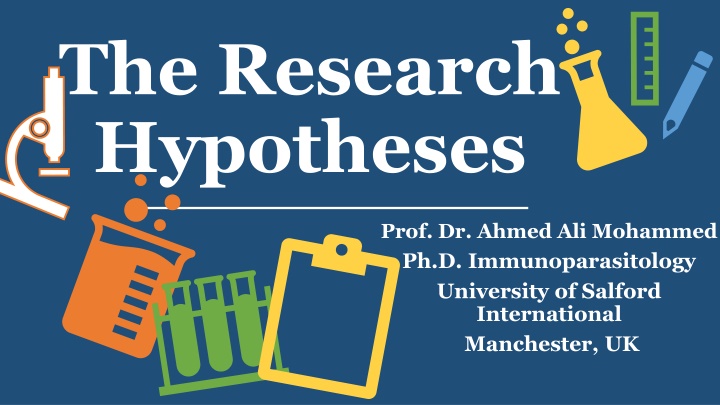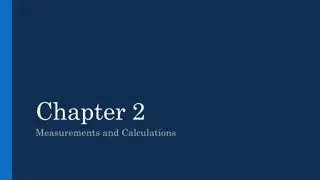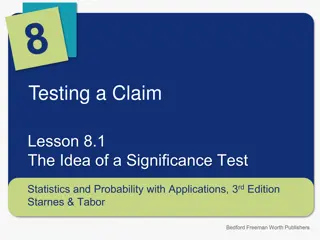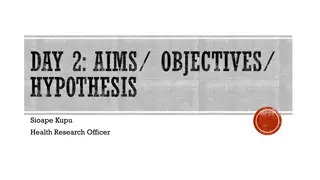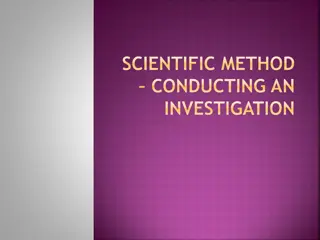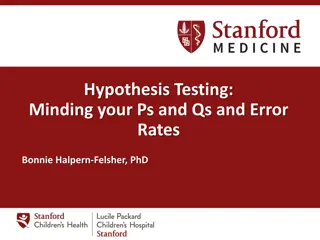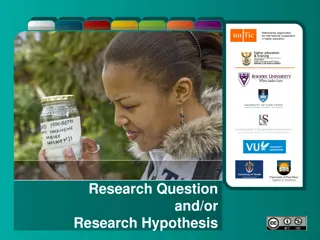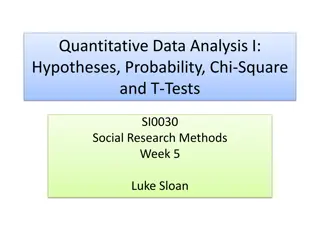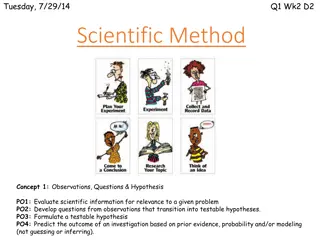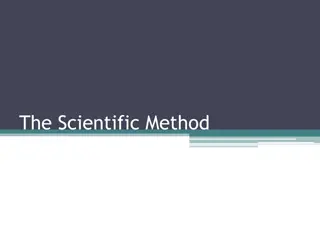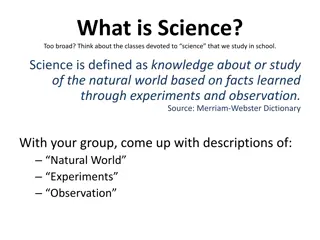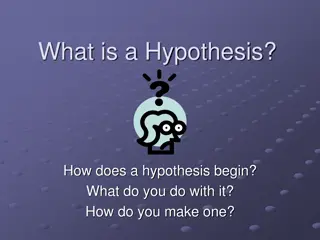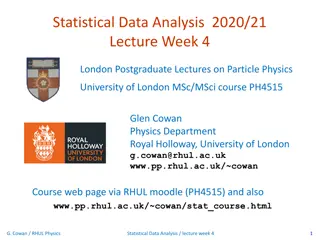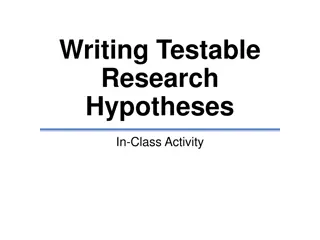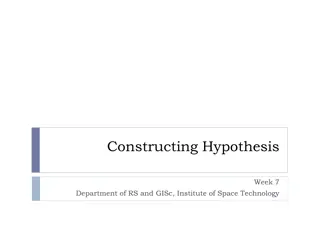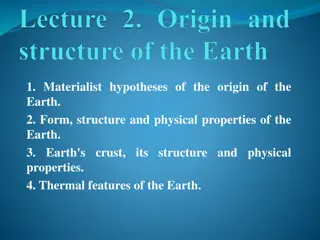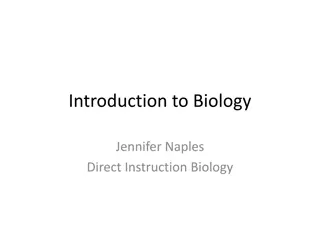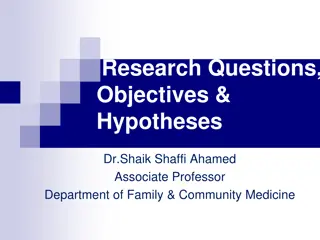Importance of Testable Hypotheses in Scientific Research
Hypotheses play a crucial role in scientific research as they provide a clear statement that can be tested. A genuine research hypothesis must be specific, testable, and falsifiable. It guides researchers in planning studies and helps in determining the outcomes. A good research hypothesis is clear, specific, and testable, allowing for evidence-based conclusions. The importance of testable hypotheses lies in their ability to be proven true or false, leading to reproducible results that are essential in progressing scientific knowledge.
Download Presentation

Please find below an Image/Link to download the presentation.
The content on the website is provided AS IS for your information and personal use only. It may not be sold, licensed, or shared on other websites without obtaining consent from the author.If you encounter any issues during the download, it is possible that the publisher has removed the file from their server.
You are allowed to download the files provided on this website for personal or commercial use, subject to the condition that they are used lawfully. All files are the property of their respective owners.
The content on the website is provided AS IS for your information and personal use only. It may not be sold, licensed, or shared on other websites without obtaining consent from the author.
E N D
Presentation Transcript
The Research Hypotheses Prof. Dr. Ahmed Ali Mohammed Ph.D. Immunoparasitology University of Salford International Manchester, UK
What is a hypothesis A hypothesis is a statement that can be tested by scientific research. A research or scientific hypothesis is a specific, clear, and testableassumption, or predictive statement about the possible outcome of a scientific research study (for example, a dissertation or thesis), based on a particular property of a population. It is an idea or explanation for something that is based on known facts but has not yet been proved. For example, if you want to test a relationship between two or more things, you need to write hypotheses before you start your experiment or data collection.
For a hypothesis to be a genuine research hypothesis, this statement needs to have three attributes: specificity, testability and falsifiability. Specifying the research hypotheses is one of the most important steps in planning a scientific quantitative research study. A quantitative researcher usually states an expectation about the results of the study in one or more research hypotheses before conducting the study, because the design of the research study and the planned research design often determined by the stated hypotheses. Thus, one of the advantages of stating a research hypothesis is that it requires the researcher to fully think.
A good research hypothesis needs to be very clear about what s being assessed (who and what is involved) and very specific about the expected outcome. A hypothesis must be testable (can be proven true) to qualify as a scientific hypothesis. If it s not testable, it s not a hypothesis. Testability means that you must be able to collect observable data in a scientifically rigorous manner to assess whether it supports the hypothesis or not. In other words, there needs to be a way to prove the claim. It is not enough for scientific hypothesis to be testable. To be a useful hypothesis, it also needs to be falsifiable (disprovable). In other words, there needs to be some identifiable way to test whether a hypothesis is false. If there s no way to assess whether a claim is false, it s not a hypothesis.
Importance of a Testable Hypothesis To be considered testable, some essential criteria must be met in your hypothesis: There must be a possibility to prove that the hypothesis is true. There must be a possibility to prove that the hypothesis is false. The results of the hypothesis must be reproducible. Without these criteria, the hypothesis and the results will be vague. As a result, the experiment will not prove or disprove anything significant.
Variables in hypotheses Hypotheses propose a relationship between two or more variables. An independent variable is something the researcher changes or controls. A dependent variable is something the researcher observes and measures. Developing a hypothesis 1. Ask a question
Writing a hypothesis begins with a research question that you want to answer. The question should be focused, specific and researchable within the determinants of your project. 2. Do some preliminary research Your initial answer to the question should be based on what is already known about the topic. Look for theories and previous studies to help you form assumptions about what your research will find. At this stage, you might construct a conceptual framework to identify which variables you will study and what you think the relationships are between them.
3. Formulate your hypothesis Write your initial answer to the question in a clear, concise sentence. 4. Refine your hypothesis There are various ways of phrasing a hypothesis, the hypothesis should contain: The relevant variables. The specific group being studied. The predicted outcome of the experiment or analysis. 5. Phrase your hypothesis in three ways To identify the variables, you can write a simple prediction. The first part of the sentence states the independent variable and the second part states the dependent variable.
In academic research, hypotheses are more commonly phrased in terms of correlations or effects, where you directly state the predicted relationship between variables. If you are comparing two groups, the hypothesis can state what difference you expect to find between them. 6. Write a null hypothesis If your research involves statistical hypothesis, you will also have to write a null hypothesis. The null hypothesis is the default position that there is no association between the variables. The null hypothesis is written as H0, while the alternative hypothesis is H1 or Ha.
Hypothesis examples Research question Hypothesis Null hypothesis Can flexible work arrangements improve job satisfaction? Employees who have flexible working hours will report greater job satisfaction than employees who work fixed hours. There is no relationship between working hour flexibility and job satisfaction.
How to Formulate an Effective Research Hypothesis Remember Safety First! (Enter your own creative tag line above) 1. State the problem that you are trying to solve. Hypothesis is not a simple statement. It is an intricate statement that needs to offer a clear introduction to a scientific experiment, its intentions, and the possible outcomes. However, there are some important things to consider when building a compelling hypothesis. -Make sure that the hypothesis clearly defines the topic and the focus of the experiment. 2. Try to write the hypothesis as an if-then statement. -If a specific action is taken, then a certain outcome is expected.
3. Define the variables. -In scientific experiments, a hypothesis proposes and examines the relationship between an independent variable and a dependent variable. The effect on the dependent variable (the idea being tested) depends on or is determined by what happens when you change the independent Remember Safety First! (Enter your own creative tag line above) variable (the factor being changed).
Some important questions to ask: Remember Safety First! (Enter your own creative tag line above) 4. Can the hypothesis be tested through experimentation? 1.Is the language clear and focused? 2. Does the hypothesis introduce the research topic? 3. Does the hypothesis include both an independent and dependent variable? Are they easy to identify? 5. Does the hypothesis explain what you expect to happen during your experiment? This is an excellent list to refer to before you begin an experiment. It can help you identify weaknesses in your hypothesis and revise it if necessary.
Thank you for your listening Thank you for your listening See you See you Remember Safety First! (Enter your own creative tag line above) Next Next Lecture Lecture
